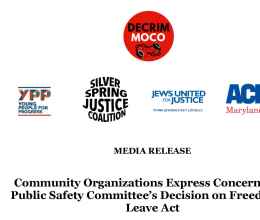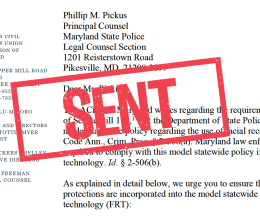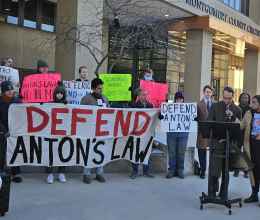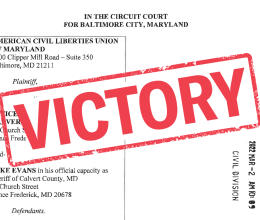
Read WAPP’s request for judicial review
BALTIMORE – Defending their democratic right to petition laws passed by Maryland’s General Assembly to referendum, Women Against Private Police (WAPP) have requested review in Anne Arundel County Circuit Court of a State Board of Elections (SBE) decision blocking them from bringing before the voters a bill authorizing creation of a private police force at Johns Hopkins University (JHU). The group, represented by the American Civil Liberties Union (ACLU) of Maryland and the Public Justice Center (PJC), challenges SBE’s rejection of their petition and makes clear that the subject of the bill is the creation of the police force — not an unrelated spending measure exempt from referendum challenge.
“If we do not challenge the Board of Elections decision, it sends the message that any bill—and especially a deeply unpopular bill like this one—can be insulated from the threat of veto at the ballot box by simply tacking on an unrelated spending measure,” said Jillian Aldebron, chair of WAPP and a resident of the JHU area. “The State Constitution does give voters the final say when they oppose passage of a bill by their elected representatives, and that is the right to veto it through a referendum. Unless we exercise and defend that right, we risk losing it.”
Under Maryland law, whether an act of the General Assembly can be petitioned to referendum depends on the bill’s primary purpose. While SB 793, the “Community Safety and Strengthening Act,” includes tangential spending measures, no one could reasonably claim that the “primary purpose” of the bill is anything other than to authorize JHU’s private police force. Debate on the bill was overwhelmingly about the merits as to whether JHU should be empowered with state law enforcement authority.
That is why WAPP has requested judicial review of the so-called “Advance Determination” made by the SBE preventing the public electorate from weighing in on SB 793 on grounds that it is an appropriation. Importantly, the spending measures included in SB 793 are unrelated to the JHU Police Department, which is the main focus of the bill. WAPP was formed on April 3, 2019, by residents living in the area that would be patrolled by a JHU police force. WAPP members opposed the bill authorizing that force during the legislative session.
“The legislative record of testimony against creation of a private police force at Johns Hopkins University makes clear how irrelevant the spending measures in the bill were,” said David Rocah, Senior Staff Attorney at the ACLU of Maryland. “The precedent created by the State Board of Elections in this case could be very dangerous, because if all legislators have to do to make a bill referendum-proof is to add an extraneous spending measure to it, then one of our key democratic rights as Marylanders is under serious threat.”
“In this case, WAPP, the ACLU, and the PJC are defending the community’s voice, the right of the people to stand up for themselves in the face of government and corporate power,” said Debra Gardner, Legal Director at the Public Justice Center. “That’s why Maryland created the referendum over a century ago. This is what democracy looks like."
###






